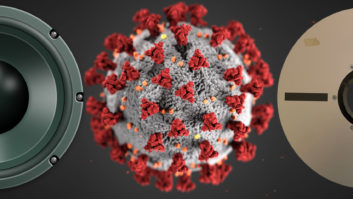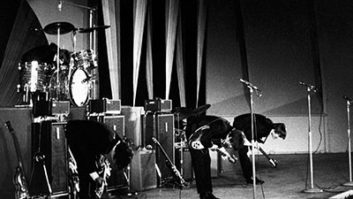No Doubt was one of the surprise reunion
tours that helped power the national-level
SR business this past summer.
by Clive Young.

A year ago, the future was not promising for the large-scale touring industry. Despite having had a strong summer, the sound reinforcement companies that tackle most national tours had plenty to be concerned about: recession, gas shortages, new gear coming down the pike, MIA artists, continued drama on the white spaces issue, and more–and then there was the unexpected collapse of Wall Street that September. No one knew what to expect in 2009, but “Good News” wasn’t high on the list.
As they say, hindsight has 20/20 vision, and while the events of last fall look just as horrendous in the rearview mirror, the time since then has been a remarkably calm one for the national touring sound providers.
“It’s no big deal; everyone just got through it all,” marveled Jack Boessneck, executive vice president of Eighth Day Sound (Highland Heights, OH). “Everyone figured people would show some kind economic restraint in their lives, but that didn’t mean they quit going to shows. They quit buying the second beer and the T-shirt–and that means musicians, us, everyone got paid. I didn’t hear of one band that fell off the road due to ticket sales.” Indeed, the only major act that stopped touring this past summer was Aerosmith–whose singer, Steven Tyler, fell off the stage.
Greg Hall, business manager for Clair Global, observed, “It does seem that the entertainment business has been generally very healthy during the recession because people need to be entertained and escape more than usual. That may be combined with the ‘stay-cation’ philosophy, where instead of taking your family for a week at the shore, you stay home but you go to a rock show.”
While the economy is only starting to show signs of economic recovery and unemployment statistics remain at disheartening levels, sound reinforcement seems to have weathered the worst. Skyrocketing gas prices–a major concern during the hot months of 2008–never truly materialized this year, much to everyone’s relief. Likewise, the summer tour schedule reflected a fairly standard mix of living legends (Paul McCartney, Bruce Springsteen, AC/DC), upstarts (Lil Wayne, Jonas Brothers), surprise reunions (Phish, No Doubt, Blink-182) and summer perennials (Dave Matthews Band, Kenny Chesney).
All these tours and others found strong receptions at the box office, and while some jaunts were aided by various promotions–most noticeably Live Nation’s “No Service Fee Wednesdays” which dropped fees on more than 5 million lawn tickets for hundreds of concerts–the end result was packed houses. “More than ever, people need to sit in the dark, take a break from it all, play some air guitar and hold their cell phone in the air during a rock concert,” mused Hall. “It’s almost required during tough times–real ‘Chicken Soup for the Soul.'”
Both tours and promoters may well have been aided by the fact that 2008’s Wall Street collapse happened in September; by the time 2009 summer tours went out for bid, enough months had passed that both the industry and the public had moved on from the initial state of panic.
“Everyone calmed down, and the only ones who didn’t were the festival people,” said one audio provider. “There were a bunch of festivals in February and March that completely went away–smaller things, plus a few smaller Christian festivals, but that was in early spring, late winter, and it was kind of a knee-jerk reaction on their part. Some festivals persevered despite the lack of sponsors–one in Detroit used to have four stage sponsors and this year they had none, but it still went off as planned.”
If sponsors and audiences have been moderately reining in costs, well, the audio providers have been, too–at least when they can. “When it comes to purchases, we react to the marketplace; we react to what our customers want,” said Boessneck. “Did I buy a bunch of gear? Absolutely. Did I buy more than usual? No. But less than usual? No.”
The other major concern of fall 2008–the then-coming FCC vote on white spaces–has also been resolved to a large extent, if not necessarily to the live sound industry’s liking. While the FCC decided to move ahead with allowing white-space devices that are now expected to hit shelves in the next few years, wording was incorporated into the ruling that, at least on paper, stands to protect wireless microphone and IEM users. At the same time, the enforced move of wireless mics out of the 700 MHz range, while delayed until late spring, took place without much fanfare, as manufacturers provided rebates and discounts for users who needed to replace older wireless systems.
The net result of all this is that while a number of factors were in place to create a near-perfect storm for live sound providers, the worst thankfully never came to pass.
“Our industry has weathered recessions before,” said Hall, “and as an industry, we’ve always been what most people would call ‘recession-proof,’ but this is the first time that we’ve ever had high ticket prices [during] the worst economic climate in everybody’s memory. That said, it seems like everybody that was out touring in this environment sold tickets in significant quantities. It’s business as usual.”
Clair
www.clairglobal.com
Eighth Day Sound
www.8thdaysound.com



